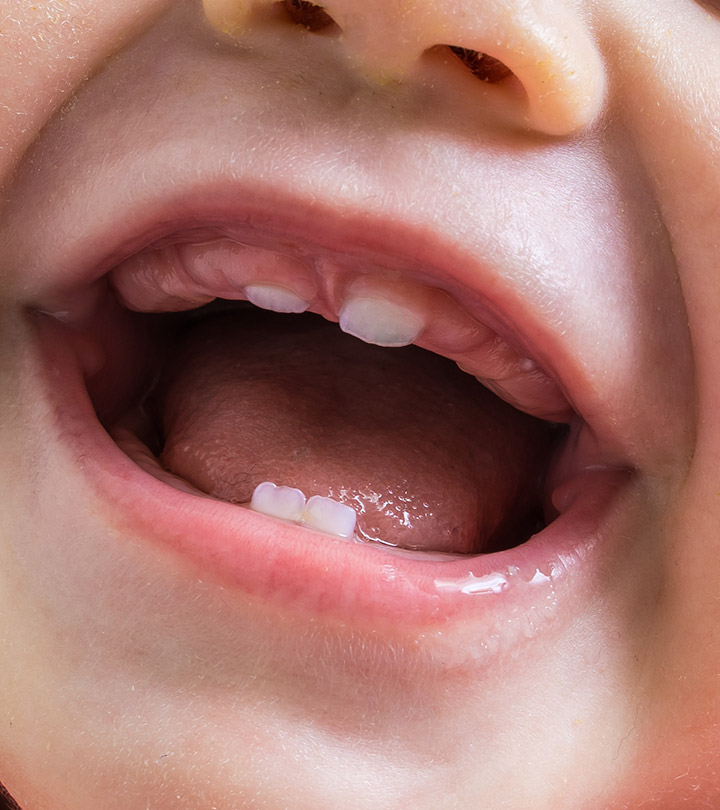Image: iStock
Children get two types of teeth, milk teeth or primary teeth and permanent teeth. Most infants get their first milk teeth at around six months, while some may not get them until they are one year old (1).
The teething period lasts until the appearance of two year old molars, the large teeth at the back of the mouth, which usually come in at 23–33 months (2). These teeth have broad and flat surfaces, which help in grinding the food properly.
Read this post to know when babies get their molars, when the final set of molars come in, and the symptoms and care for molars in babies.
When Do Babies Get Molars?
Children have two pairs of first molars and second molars, one pair each on the lower and upper jaws. Their temporary first molars usually appear between 12 and 16 months and the second molars between 20 and 30 months (3). The sequence of teething may vary among children. Hence, if your baby does not get their molars within the stipulated time, it is not a reason for worry.
What Are The Signs And Symptoms Of Molar Eruption In Babies?
When your baby’s second set of molars start to come in, you may notice some signs and symptoms such as the following (4) (5):
- Crankiness and short temper because the teething process may hurt
- Drooling due to extra saliva production (not seen in all children)
- Low-grade fever with temperatures ranging from 98 to 100°F
- Chewing on fingers or clothing, which encourages them to use their tongue and makes them aware of it
- Disrupted sleep due to pain. Less sleep also heightens their sensitivity toward pain.
- Pain and redness in the gums around the area of teeth eruption
What Are The Remedies For Pain From Molar Eruption In Babies?
Some children do not experience much pain when their molars come in, but this is not the case for all. Some remedies to help reduce their teething pain are as follows (4):
- Rub their gums with a clean finger or a soft, moist piece of cloth
- Place a cold spoon on their gums.
- Use rubber teething rings. Ensure you are present while they use it so that they do not choke.
How To Care For Your Two-Year-Old’s Molars?
After your baby’s molars have emerged, maintain the following oral habits to ensure healthy teeth and gums and avoid infection or plaque (5) (6):
- Clean their mouth after each feeding to avoid bacteria build-up, which may cause tooth decay or loss.
- Use a soft toothbrush to brush their teeth on all sides in a circular motion with gentle strokes.
- Avoid brushing in the back and forth direction as it might hurt their gums.
- Use a grain-sized amount of fluoride toothpaste for children below the age of 3 years, as fluoride decreases the risk of caries (7).
What Should You Avoid When Your Baby Is Teething?
Avoid the following things when your baby is teething (4) (5):
- Sugary foods such as packaged fruit juices and chocolates
- Snacks or solid foods that might stick to their teeth
- Frequent night feedings after the appearance of their first tooth
- Topical medications such as creams, gels, or similar types of products to treat oral pain in babies
When Should You See A Doctor?
A mild fever while teething is fairly normal. However, the following conditions may indicate an underlying health problem in your baby (5):
If you notice any of the above symptoms in your baby, contact your health professional or dentist.
Babies start teething at around six months and continue till they are around two and a half years old. The emergence of the 2 year old molar marks the end of their teething period. It is important to begin instilling good dental habits in your child, such as brushing twice a day and rinsing well after every feeding, from a young age. Following proper dental hygiene habits go a long way.
References:

